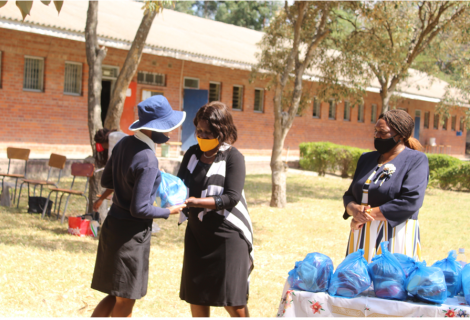ActionAid Zimbabwe's partner FAWEZI donates COVID- 19 relief and hygiene packs to vulnerable school students

The COVID-19 pandemic brought to light a lot of social-economic gaps, especially in the education sector. The risk of adverse effects of COVID-19 was significantly higher for school children in rural communities especially with educational gaps, from failure to access online lessons to accessing a basic meal. It’s always been an obstacle for the girl child from a less economically privileged background to access sanitary wear or for any school child to access a basic balanced meal, and these challenges have forced a lot of children to miss classes, skip school or even drop out of school. These challenges faced by female learners not only negatively impact on their participation and performance in school, but also take away their dignity, self-confidence and self-esteem.
According to Enenti Tini a teacher at Madziwa Mine Secondary School in Shamva, absence of proper sanitary products may result in girls missing school during their menstrual period. The major reason is that they fear leakage and messing up, which in turn attracts teasing from other learners and some male educators as well. In order to avoid this, most girls opt to miss school during their period.
The government has also attempted to establish programs to provide disposable sanitary pads to female learners. While this is a noble move, the reality is that menstrual management continues to be quite challenging. Even though some schools receive disposable pads, not all learners are reached and the sustainability of the supply is a major issue.
Ms Tini also noted that most girls get sanitary pads from parents and family members who may fail to provide enough or at a time convenient for the girls. Sometimes the girls have to buy them for themselves. They may rely on boyfriends if they cannot afford them, hence exposing themselves to the risk of sexual abuse, which may result in unexpected and unwanted pregnancies. Eventually, their schooling is disrupted, and they end up dropping out.
A 2015 survey by The Ministry of Women Affairs, Community, Small and Medium Enterprises Development, indicate that 20% of girls miss school due to period pain while 67 percent miss school due to lack of pads and 26 percent stay home because of heavy flows during menstruation. These findings illustrate that menstrual related challenges faced by female learners negatively impacts on their participation and performance in school. It also takes away their dignity, self -confidence and esteem. Female learners go through a rough time during their menstrual period in the school environment where they spend the greater part of their time in. Menstrual health challenges have become a major contributor to girl school drop-outs, poor female learner performance and poor grades.
As a way to fill this gap, the Forum for African Women Educationalists- Zimbabwe Chapter (FAWEZI) under the Towards for Resilient Communities with Health, Equity and Safety for all (TORCHES) project in partnership with Family Aids Caring Trust (FACT), ActionAid Zimbabwe and Leonard Cheshire Disability Zimbabwe (LCDZ) donated COVID-19 relief hampers to vulnerable children in May 2021.The donations were given to five schools in Shamva and Chitungwiza District respectively where the project is being implemented.
The Shamva schools that got donations include Wadzanayi Primary and Secondary, Madziwa Mine Primary and Secondary and Shamva Ming Chang Primary whereas Chitungwiza schools include Chaminuka and Tafadzwa Primary schools, Seke Mhuriimwe, Seke 3 and Seke 5 High schools. The relief humper consisting of mealie meal, cooking oil, flour, sugar and soya chunks catered for 300 boys and girls in different age groups and classes. 200 girls from both districts were equipped with dignity packs that included reusable sanitary wear, pants, bath soap, body cream and a face towel.
The main aim of the donations was to support vulnerable students eradicate challenges they face during their menstrual periods leading to absconding lessons and poor performance at school. All the students who received the hygiene pack where taken through a capacity building training on the proper use, maintenance, cleaning and storage of the reusable sanitary wear. ‘Through the training held, I am able to separate myths and facts surrounding the reusable pads for my safety and health,’ stated one of the hygiene pack recipients in Chitungwiza District.
All the teachers present supported this initiative and noted that this will prevent girls from missing classes during their menstruation period since one can wear the reusable sanitary wear for a maximum of three to four hours thus giving them more time to concentrate on their school work for better results.
A student from Shamva acknowledged the dignity pack and noted that this will improve attendance as there won’t be any health implications such as sores and rashes that develop after using alternative such as cloths and unprocessed cotton during menstruation.
Another student was happy to be able to participate in girls’ soccer as she could not before due to fear that the cloth she uses during her periods might drop in public which is embarrassing especially for school going children and appreciated the assistance from the TORCHES projects.
The TORCHES project came as an extension to another project that was conducted in 2020 in the same districts. The project is complimenting effects by the previous project in supporting beneficiaries in line with the challenges brought by the COVID-19 pandemic. The TORCHES project strategic goal is the achievement of communities where women and girls are free from violence and have amplified voice and agency.